|
|
|
Sort Order |
|
|
|
Items / Page
|
|
|
|
|
|
|
| Srl | Item |
| 1 |
ID:
145875
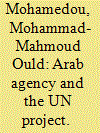

|
|
|
|
|
| Summary/Abstract |
Discussion of the contemporary Arab state system overlooks the engagement of the nascent League of Arab States with the debates about world politics and the purposes of the UN system emerging from World War II. The early experience of that body did not articulate a full expression of universalism, and the integrative cooperation of the Arab League was confined to a limited security policy framework. It did not subsequently seek lastingly to influence the nature of those ideas and institutions that would come to shape the United Nations. The Arab League was also never wedded to a Global Southern logic. Yet the UN has seldom been disavowed in the League’s diplomatic processes, which have been used by member states tactically as a conduit to maximise regional interpretations of the challenges from global order and as a forum for advancing the sub-region’s provincial interests.
|
|
|
|
|
|
|
|
|
|
|
|
|
|
|
|
| 2 |
ID:
116816
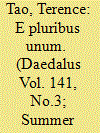

|
|
|
|
|
| Publication |
2012.
|
| Summary/Abstract |
In this brief survey, I discuss some examples of the fascinating phenomenon of universality in complex systems, in which universal macroscopic laws of nature emerge from a variety of different microscopic dynamics. This phenomenon is widely observed empirically, but the rigorous mathematical foundation for universality is not yet satisfactory in all cases.
|
|
|
|
|
|
|
|
|
|
|
|
|
|
|
|
| 3 |
ID:
178435
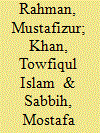

|
|
|
|
|
| Summary/Abstract |
The number of people aged more than 60 in Bangladesh is projected to constitute 20% of total population by 2051. The demographic momentum makes it necessary to pursue policies that guarantee a secured life for the country’s senior citizens. Currently, more than 40% of old age population (more than 65 years) in Bangladesh do not receive any type of pension or social security benefits. In this backdrop, introduction of a universal pension scheme (UPS) is an idea that should merit serious consideration. The idea of a UPS is also aligned with several Sustainable Development Goals (SDG) targets. Based on the International Labour Organization multi-pillar pension model, the article deals with required financing under different scenarios of introducing UPS in Bangladesh. The study estimates that for introducing a non-contributory UPS in Bangladesh, it would require an additional average allocation equivalent to 0.1%–0.5% of gross domestic product per annum between now and 2040. The article also estimates financing needs considering two options for the contributory UPS. The article concludes that UPS in Bangladesh can be launched on a limited scale which then could be expanded in scope and coverage in a gradual and phased manner. The article also underscores that introduction of UPS will create opportunities to rationalize the existing safety net programmes that will release funds for underwriting the UPS.
|
|
|
|
|
|
|
|
|
|
|
|
|
|
|
|
| 4 |
ID:
130822
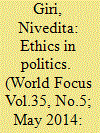

|
|
|
|
|
| Publication |
2014.
|
| Summary/Abstract |
Till recently when India passed through its l6th general Elections, the election Commission of India appealed Indian citizens to select candidates and dump the criminals and the corrupt ones. It also urged the voters to sign a pledge to be ethical while casting their votes in the coming Lok Sabha elections. The Election Commission also appealed the voters to cast their votes without fear or greed, and without keeping caste, religion and creed consideration in mind. The commission's letter also stated that electing a candidate is not merely a citizen's right but his/her responsibility. Ethics and morality have been the hallmark of public life in India since ancient times. Rulers were expected to observe stricter ethical values. Ethics and politics, in other words, were inseparable. This ethical and moral legacy was inherited by its national leaders, who demonstrated a high degree of probity and honesty in public life during the freedom struggle. The early national leaders and political philosophers believed that politics without morality is a thing to be voided. However, in recent years there is a general feeling that all is not well with the Indian political system which is functioning under great strain. It has been noticed and concerns are being expressed over the general decline of values in public life. Recent trends in politics, however, appear to have created an impression as if, the capacity of Indian democratic system to ensure integrity in public life is increasingly going down.
|
|
|
|
|
|
|
|
|
|
|
|
|
|
|
|
| 5 |
ID:
145876
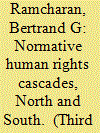

|
|
|
|
|
| Summary/Abstract |
This essay submits that events preceding and leading to the establishment of the United Nations, in the 1940s, saw the emergence of foundational human rights ideas that have shaped the international order ever since. While the major wartime powers were the sponsoring actors, there were strong demands for justice and equality in countries of the South. It was a combination of Northern, Southern and NGO contributions that shaped the content of the normative human rights framework. No country came to this with fully clean hands. The leading powers sought to shield themselves from colonialism, gulags and racial segregation but had to agree to principles and norms that would triumph in the end. Southern representatives, some partly educated in the West but mostly taking their essence from their own soils, argued for high principles and norms, and then many proceeded to violate them once they had gained control of their countries. Many Latin American leaders advanced lofty principles while presiding over exploitative feudal societies at home. The gulf between principles and practice continues in our times, with numerous violations of human rights worldwide.
|
|
|
|
|
|
|
|
|
|
|
|
|
|
|
|
| 6 |
ID:
093561
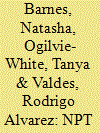

|
|
|
|
|
| Publication |
2010.
|
| Summary/Abstract |
This article assesses the impact of the U.S.-led disarmament agenda on the disarmament diplomacy and policies of the three nuclear-capable states not party to the Treaty on the Non-Proliferation of Nuclear Weapons (NPT)-India, Israel, and Pakistan. These states, often referred to as "NPT holdouts," undermine the application of the NPT obligations on all parties. Universality of the treaty framework has long been considered vital to strengthen the nuclear nonproliferation regime and consolidate non-nuclear norms. But can new U.S.-led disarmament momentum create the necessary dynamics to encourage the holdouts to disarm, or is this wishful thinking? This article argues that sustained disarmament momentum from the Western NWS will not be enough-a more comprehensive approach to disarmament is needed, including a genuine commitment by all NWS to engage in transparency and reductions, and full nuclear compliance and cooperation by Iran.
|
|
|
|
|
|
|
|
|
|
|
|
|
|
|
|
| 7 |
ID:
193254
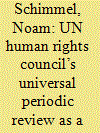

|
|
|
|
|
| Summary/Abstract |
Applying the case study of Saudi Arabia, this article examines the rhetoric of nations who are well documented as being severe violators of human rights and the use they make of the UN Human Rights Council Universal Periodic Review (UPR) mechanism to defend, downplay, and deny their human rights violations. Authoritarian countries who violate human rights systemically, severely, and intentionally as a matter of government policy apply different rhetorical strategies when undergoing the UPR process and writing and submitting their respective national reports for the UPR process. This article analyzes these strategies, illustrates how different countries use them during the UPR process, and explores the value and limitations of the UPR process and its efficacy at advancing human rights.
|
|
|
|
|
|
|
|
|
|
|
|
|
|
|
|
| 8 |
ID:
164678
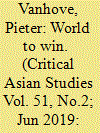

|
|
|
|
|
| Summary/Abstract |
This article analyzes Chinese contributions to the Afro-Asian Writers’ Bureau’s efforts to reinvent World Literature from an anti-imperialist and anti-capitalist perspective. The Afro-Asian Writers’ Bureau was founded as a counter-narrative to Eurocentric conceptions of World Literature and universal culture. The AAWB’s vision was inspired by a Marxian understanding of worldliness. Relying on Chinese archival materials, this article shows how Chinese representatives to the AAWB, including Zhou Yang and Mao Dun, shifted from an explicitly Soviet, socialist-realist model for World Literature inspired by Maxim Gorky to a progressively independent, nationalist course in the wake of the Sino-Soviet split. The story of the AAWB is one of competing universal visions. The Chinese contributions to the AAWB are also reflected in China’s current expanding cultural influence and soft power in the Global South.
|
|
|
|
|
|
|
|
|
|
|
|
|
|
|
|
|
|
|
|
|